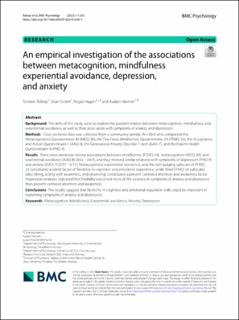| dc.contributor.author | Ådnøy, Torstein | |
| dc.contributor.author | Solem, Stian | |
| dc.contributor.author | Hagen, Roger | |
| dc.contributor.author | Havnen, Audun | |
| dc.date.accessioned | 2023-11-28T09:51:57Z | |
| dc.date.available | 2023-11-28T09:51:57Z | |
| dc.date.created | 2023-09-22T13:16:11Z | |
| dc.date.issued | 2023 | |
| dc.identifier.issn | 2050-7283 | |
| dc.identifier.uri | https://hdl.handle.net/11250/3104962 | |
| dc.description.abstract | Background
The aims of this study were to explore the possible relation between metacognition, mindfulness, and experiential avoidance, as well as their association with symptoms of anxiety and depression.
Methods
Cross-sectional data was collected from a community sample (N = 364) who completed the Metacognitions Questionnaire-30 (MCQ-30), the Five Facet Mindfulness Questionnaire-24 (FFMQ-24), the Acceptance and Action Questionnaire-II (AAQ-II), the Generalized Anxiety Disorder 7-item (GAD-7), and the Patient Health Questionnaire-9 (PHQ-9).
Results
There were moderate-strong associations between mindfulness (FFMQ-24), metacognition (MCQ-30), and experiential avoidance (AAQ-II) (0.62 − 0.67), and they showed similar relations with symptoms of depression (PHQ-9) and anxiety (GAD-7) (0.57 − 0.71). Mindfulness, experiential avoidance, and the non-judging subscale of FFMQ-24 constituted a latent factor of flexibility in cognition and emotional experience, while three FFMQ-24 subscales (describing, acting with awareness, and observing) constituted a present-centered attention and awareness factor. Regression analyses indicated that flexibility explained more of the variance in symptoms of anxiety and depression than present-centered attention and awareness.
Conclusions
The results suggest that flexibility in cognitive and emotional regulation skills could be important in explaining symptoms of anxiety and depression. | en_US |
| dc.language.iso | eng | en_US |
| dc.publisher | BioMed Central (BMC) | en_US |
| dc.rights | Navngivelse 4.0 Internasjonal | * |
| dc.rights.uri | http://creativecommons.org/licenses/by/4.0/deed.no | * |
| dc.title | An empirical investigation of the associations between metacognition, mindfulness experiential avoidance, depression, and anxiety | en_US |
| dc.title.alternative | An empirical investigation of the associations between metacognition, mindfulness experiential avoidance, depression, and anxiety | en_US |
| dc.type | Peer reviewed | en_US |
| dc.type | Journal article | en_US |
| dc.description.version | publishedVersion | en_US |
| dc.source.pagenumber | 8 | en_US |
| dc.source.volume | 11 | en_US |
| dc.source.journal | BMC Psychology | en_US |
| dc.source.issue | 1 | en_US |
| dc.identifier.doi | 10.1186/s40359-023-01336-7 | |
| dc.identifier.cristin | 2177947 | |
| cristin.ispublished | true | |
| cristin.fulltext | original | |
| cristin.qualitycode | 1 | |

